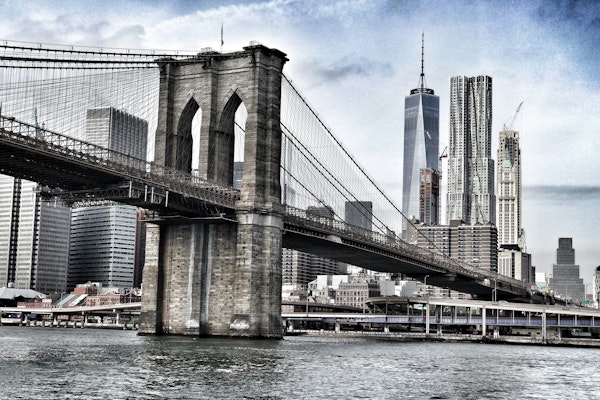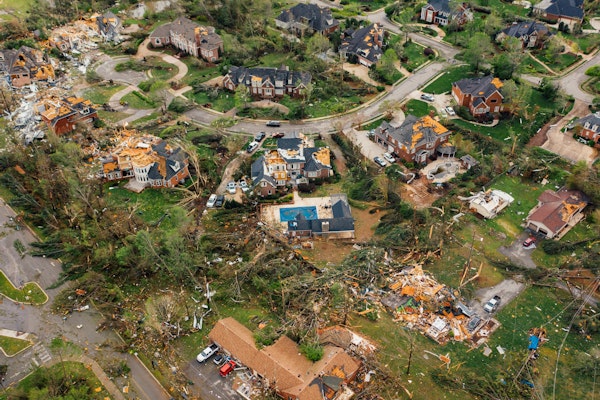
CMS Expands Section 111 Reporting to Include Voluntary WCMSA Data for Workers’ Compensation Claims
Beginning April 4, 2025, CMS requires Responsible Reporting Entities to include available WCMSA data in Section 111 reports for workers’ compensation settlements involving Medicare beneficiaries.
June 2, 2025
Insurance Industry
Legislation & Regulation
Risk Management
Workers' Compensation

What the NCCI AIS 2025 Revealed About the Future of Workers Compensation
The NCCI AIS 2025 conference revealed how workers comp is staying strong amid economic uncertainty, with trends in claim frequency, medical use, and emerging industry risks.
May 21, 2025
Insurance Industry
Risk Management
Technology
Workers' Compensation

Mexican Navy Training Ship Crashes into Brooklyn Bridge Killing Two and Injuring Several
A Mexican Navy training vessel collided with the Brooklyn Bridge during a goodwill tour, leaving two dead, multiple injured, and prompting an ongoing investigation.
May 20, 2025
Catastrophe
Marine
Risk Management
Workers' Compensation
New York

Correction Officers Accused of Defrauding NYC Workers’ Comp System Through False Injury Claims
Three current and former Rikers Island correction officers are accused of faking on-duty injuries to claim nearly $1 million in workers’ compensation benefits.
May 20, 2025
Fraud
Insurance Industry
Litigation
Workers' Compensation
New York

Connecticut Moves Swiftly to Block Massive Spike in Workers’ Compensation Insurance Rates
Facing a 235% hike in workers’ compensation premiums after a court ruling, Connecticut lawmakers passed urgent legislation to stabilize insurance costs for employers statewide.
May 20, 2025
Insurance Industry
Legislation & Regulation
Risk Management
Workers' Compensation
Connecticut

Workers’ Comp Remains Profitable in 2024 as Claim Severity Rises and Premiums Drop
Despite a 3% drop in premiums and rising claim severity, the workers’ comp sector posted an 86% combined ratio in 2024, marking 11 straight years of underwriting gains.
May 20, 2025
Insurance Industry
Risk Management
Workers' Compensation

West Virginia Man Charged After Illegally Using Over $20K in Deceased Relative’s Workers’ Comp Payments
A Salt Rock resident faces multiple felony charges after admitting to using more than $20,000 in workers’ comp benefits sent in error to his deceased relative’s account.
May 20, 2025
Fraud
Insurance Industry
Litigation
Workers' Compensation
West Virginia

Property and Casualty Insurance Sees Best Underwriting Year Since 2013
The U.S. property and casualty insurance industry posted a 96.5% combined ratio in 2024, driven by a sharp recovery in personal lines and improved property performance.
May 9, 2025
Auto
Liability
Property
Workers' Compensation

Care Facility Worker Wins $40K in Retaliation Penalties After Reporting Safety and Labor Violations
A San Jose care facility worker was awarded over $40,000 in penalties after being unlawfully fired for reporting unsafe conditions and labor violations to California authorities.
May 8, 2025
Legislation & Regulation
Litigation
Risk Management
Workers' Compensation
California

Solving the Adjuster Shortage with Agentic AI and Digital Coworkers
As the insurance industry faces a wave of retirements among claims adjusters, Agentic AI offers a scalable, efficient solution to maintain service levels and preserve expertise.
May 6, 2025
Insurance Industry
Property
Technology
Workers' Compensation

Early Behavioral Health Support Significantly Shortens Workers’ Comp Claim Duration
New Sedgwick research shows that addressing mental health within the first 90 days of a claim can reduce recovery time by up to 70%, improving return-to-work outcomes.
May 6, 2025
Education & Training
Life & Health
Risk Management
Workers' Compensation
California
New York

Gen Z Still Leads in Workplace Mental Health Struggles Despite Slight Improvement
Although mental health concerns among Gen Z workers have slightly declined, they remain higher than other generations, highlighting the ongoing need for employer support.
May 1, 2025
Education & Training
Insurance Industry
Risk Management
Workers' Compensation

Four Charged in Southern California Workers Compensation Fraud Scheme
California officials charged four people with felony conspiracy and unlawful referrals in a $14.5 million workers’ compensation fraud scheme targeting Spanish-speaking workers.
April 28, 2025
Fraud
Insurance Industry
Legislation & Regulation
Workers' Compensation
California

New York Court Blocks City’s Attempt to Recoup Firefighter Injury Payments After Retirement
A New York court has ruled that post-retirement pension supplements paid to an injured firefighter are not subject to reimbursement under workers’ compensation laws.
April 21, 2025
Liability
Litigation
Risk Management
Workers' Compensation
New York

How Digital Payments Are Reshaping the Insurance Claims Experience
The insurance industry is navigating complex challenges to digitize payments, improve claims satisfaction, and meet the rising expectations of policyholders and vendors.
April 18, 2025
Auto
Insurance Industry
Technology
Workers' Compensation




